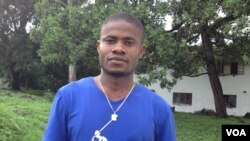It was a year ago on August 8 that the World Health Organization declared Ebola to be an international health emergency. The outbreak, the worst in history, has killed more than 11,000 people in West Africa.
But about 13,000 people have beaten the virus in Guinea, Liberia and Sierra Leone, the WHO has said.
Yusuf Kabba was one of them. He caught the virus last October during the height of the crisis. He survived but is haunted by what he saw firsthand in the treatment centers.
“I was seeing horrible things," Kabba said. "I was seeing corpses, seeing suffering, seeing people dying. ...”
To help former Ebola patients like himself cope, he started the Sierra Leone Association of Ebola Survivors, and he's also trying to educate others about the virus.
That kind of community engagement is believed to have played a crucial role in containing the epidemic, said Dr. Anders Nordstrom, who heads the WHO in Freetown.
“There have been major challenges here with trust of people in communities, believing there are certain things you need to do [for Ebola prevention] and there is a possibility to survive," Nordstrom said. "So just for people to see that you can survive has helped a lot.”
International conference
Nordstrom said that because survivors face so many post-Ebola issues, it was important to have an international conference to learn more about them.
Health workers, scientists and other experts came together this week in Sierra Leone to discuss advances in clinical care, research and "bio-banking," which involves the storing of biological samples for further study.
Survivors also talked about the challenges they still face, including emotional trauma, joint pain and vision problems.
Kabba said he hoped survivors could get more financial assistance because many have lost their livelihoods from getting sick and facing stigma.
The end of the crisis is in sight, with cases now a small fraction of what they were a year ago and scientists working on a possible vaccine. But Kabba said he hoped the world would not forget what happened to his country.
“The issue of Ebola is a global issue, and not just Sierra Leone,” he said.




